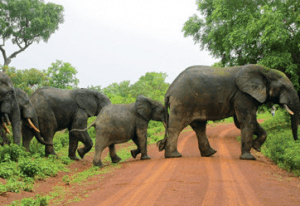Illicit wildlife trade said to be worth $19b per year globally
 The illegal wildlife trade is a threat to national security and the global crime is worth $19 billion a year, advocacy group World Wildlife Fund (WWF) has said.
The illegal wildlife trade is a threat to national security and the global crime is worth $19 billion a year, advocacy group World Wildlife Fund (WWF) has said.
According to a WWF report published December 12, 2012, the illicit trade is perceived by organized criminals to be high profit and low risk and it is the fourth largest illegal global trade after narcotics, counterfeiting, and human trafficking.
The report titled “Fighting illicit wildlife trafficking: A consultation with governments”, indicated that besides driving many endangered species towards extinction, illegal wildlife trade strengthens criminal networks, undermines national security, and poses increasing risks to global health.
“Wildlife crime has escalated alarmingly in the past decade. It is driven by global crime syndicates, and so we need a concentrated global response,” said Jim Leape, Director General of WWF International.
Leape adds that “It is communities, often the world’s poorest, that lose the most from this illicit trade, while criminal gangs and corrupt officials profit. Frontline rangers are losing their lives and families that depend on natural resources are losing their livelihoods.”
The report found that much of the trade in illegal wildlife products is run by sophisticated criminal networks with broad international reach and the profits made from wildlife trafficking are used to purchase weapons, finance civil conflicts and underwrite terrorist-related activities.
Experts say consumer demand is exacerbated by the increased accessibility of illegal wildlife products through the internet.
“The demand for illegal wildlife products has risen in step with economic growth in consumer countries, and with the ‘easy money’ and high profits to be made from trafficking, organized criminals have seized the opportunity to profit,” said Steven Broad, Executive Director of TRAFFIC, a wildlife trade monitoring network.
Interviewees for the Report were of the opinion that illegal wildlife trade is almost always seen by governments as exclusively an environmental problem and is not treated as a transnational crime and justice issue.
“Governments need to address wildlife crime as a matter of urgency,” said Leape, adding, “It is not just a matter of environmental protection, but also of national security. It is time to put a stop to this profound threat to the rule of law.”
In an approach to fight illicit wildlife trafficking, the report urged for greater resourcing, inter-ministerial cooperation, and the use of modern intelligence-led investigative techniques to identify and prosecute wildlife criminals.
It also said governments and non-governmental organizations have an important role in holding countries publicly accountable for delivering on their international commitments.
By Ekow Quandzie
